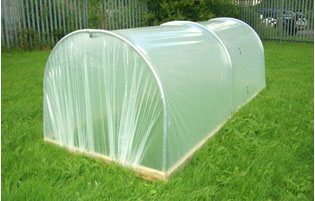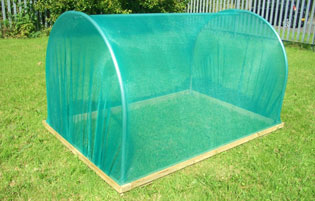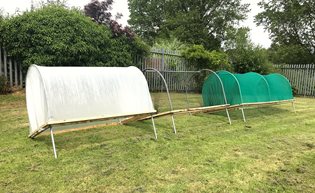It may not show nature in bloom, but winter is still a spectacular time of year. Just think of the snowy landscape and frost on the trees. Pretty as it is, however, this season often affects plants that aren’t fully protected. Cold weather can cause the water in a plant’s cells to freeze, damaging cell walls and causing it to wilt.
Tender plants are more easily impacted; if hit by frost damage, they tend to appear limp, blackened and distorted, while their leaves take on a translucent look. However, strong plants and evergreens are also vulnerable to severe cold. In the event of frozen soil, their roots become unable to absorb water, causing the plant to die from dehydration.
Therefore, frost protection for plants is crucial. To achieve this, a strategy is needed. To help you protect your garden during the chilly months, we’ve created a straightforward guide.
Shield your plants from the cold
 You don’t need a greenhouse to keep plants warm this season – you can just as easily do this with a tunnel cloche. If you’re a seasoned gardener, you’ll already know that this small cover provides excellent frost protection for plants, particularly those that are tender. Both polythene and net cloches are effective at shielding less hardy plants.
You don’t need a greenhouse to keep plants warm this season – you can just as easily do this with a tunnel cloche. If you’re a seasoned gardener, you’ll already know that this small cover provides excellent frost protection for plants, particularly those that are tender. Both polythene and net cloches are effective at shielding less hardy plants.
Select the right shelter
Cloches essentially work like mini polytunnels, protecting plants from the elements. Both polythene and net cloches are designed to shield plants and crops against frost and weather damage. The main difference between the two is that polythene cloches contain more heat inside than those made out of net, which offer shade and ventilation.
So, if you’re seeking frost protection for plants that are tender, it may be best to opt for a polythene cloche.
Enjoy a lifetime of plant protection
Our garden cloches are built to last for years, meaning that they can withstand numerous winters. Once yours is set up, all that’s left to do is tend your plants.
Don’t worry about garden space
 Looking for a small garden cloche? No problem! Our cloches are 4ft wide, 3ft 7in high and start at 6ft long. Portable and removable, these nifty tools are perfect for anyone seeking temporary frost protection for plants. Better still, a mini polytunnel can help you to keep your garden looking spacious.
Looking for a small garden cloche? No problem! Our cloches are 4ft wide, 3ft 7in high and start at 6ft long. Portable and removable, these nifty tools are perfect for anyone seeking temporary frost protection for plants. Better still, a mini polytunnel can help you to keep your garden looking spacious.
Keep soil frost-free
How do I guard soil against frost? Very often, all it takes is a thick mulch of manure, straw or leaves to prevent your soil from freezing. Spread it at the base of plants and over bulbs to ensure ultimate frost protection for plants. You won’t just be shielding your tender plants against winter’s chill – through this method, evergreen and more resistant plants will able to absorb enough moisture throughout the season, however frosty it gets.
Maximise protection for tender plants
 Are you growing highly tender plants this winter? Perhaps you’ve got a herbaceous patch that you want to keep going through the season? Or is the weather shaping up to be particularly bad this year? Net and polythene cloches offer extremely effective frost protection for plants – but if you’re wanting to further boost the safety of your plants, you can.
Are you growing highly tender plants this winter? Perhaps you’ve got a herbaceous patch that you want to keep going through the season? Or is the weather shaping up to be particularly bad this year? Net and polythene cloches offer extremely effective frost protection for plants – but if you’re wanting to further boost the safety of your plants, you can.
If you want to avoid the threat of frosty soil altogether, transfer tender plants into pots. That way, you’ll be able to grow them outside under your mini polytunnel with a greater peace of mind.
Combat winter rain
In addition to snow, frost and cold, winter – as we all know – usually brings plenty of rain. Although this can help to nourish our plants, too much drowns crops – and this is particularly troubling for those that are low-growing. Luckily, you can avoid this problem by placing a layer of gravel or grit at the base of each plant. Alongside your cloche, you’ll have everything you need for your garden to survive this winter.